Israel-Hamas war: ‘Intense bombardment’ overnight as fireball lights up Gaza city
As a fireball lit up the night sky in a southern Gaza city, explosions could be heard in the north where Israeli troops have been attacking the city’s largest hospital. Warning: Graphic.
World
Don't miss out on the headlines from World. Followed categories will be added to My News.
The southern Gaza Strip came under intense Israeli bombardment overnight, despite international pressure for an immediate ceasefire in the Palestinian territory where famine is looming.
Besieged Gaza is in desperate need of aid and the United States said it would continue airdrops, despite pleas from Hamas to stop the practice after the Islamist group said 18 people had died trying to reach food packages.
A fireball lit up the night sky in the southern city of Rafah, the last remaining urban centre in Gaza not to have been attacked by Israeli ground forces. About 1.5 million people are crammed in the area, many having fled south towards the border with Egypt.
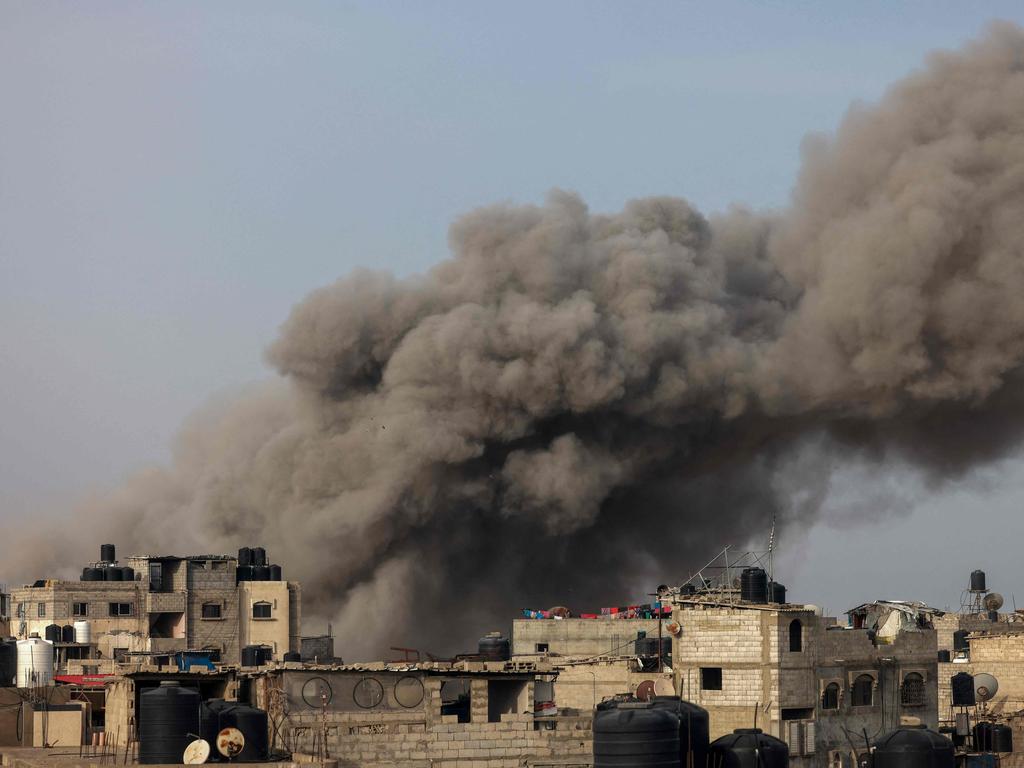
The sound of explosions was also heard and smoke was seen rising in Gaza City in the north, where Israeli troops have been attacking the city’s largest hospital for more than a week.
The health ministry in Hamas-run Gaza said early Wednesday that 66 people had been killed overnight, including three killed in Israeli air strikes in and around Rafah.
The fighting went on unabated two days after the UN Security Council passed its first resolution calling for an “immediate ceasefire” and urging the release of the roughly 130 hostages Israel says remain in Gaza, including 34 captives who are presumed dead.
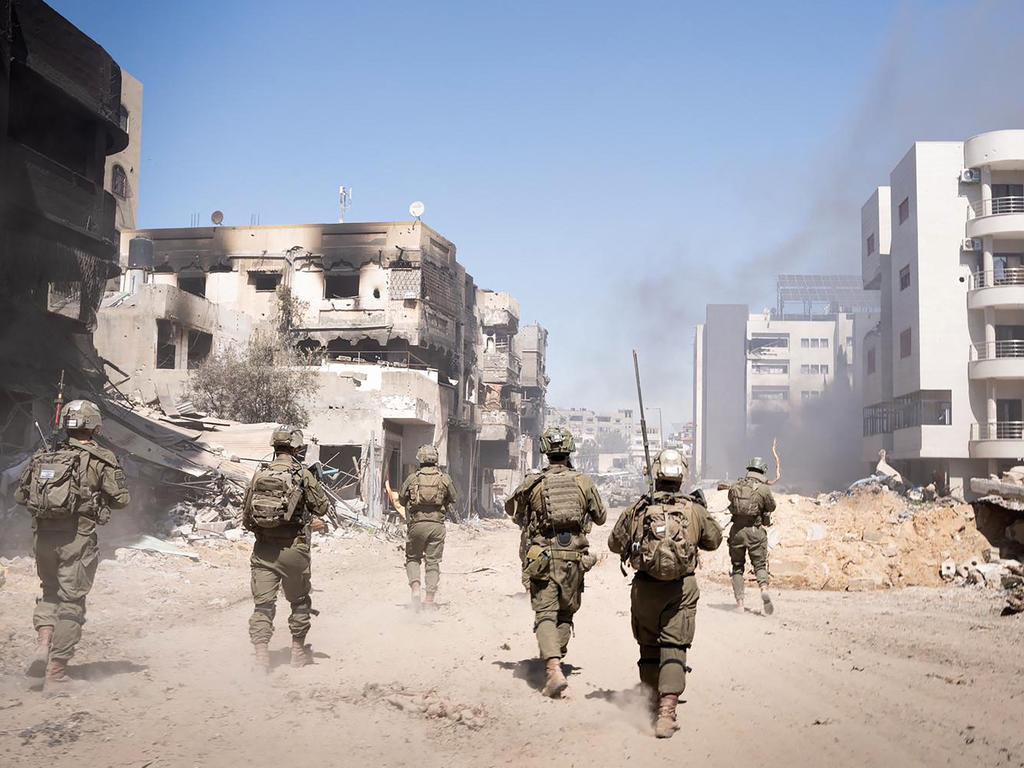
Israeli forces have also surrounded two hospitals in Khan Yunis, where the health ministry said 12 people, including some children, were killed in an Israeli strike on a camp for the displaced.
The Palestinian Red Crescent has warned that thousands were trapped in the Nasser hospital in Khan Yunis and “their lives are in danger”.
FOLLOW UPDATES BELOW:
TANKS SURROUND GAZA HOSPITAL USED AS A REFUGE FOR CIVILIANS
Israeli tanks and armoured vehicles surrounded a hospital in Gaza’s Khan Yunis, witnesses said, as the Palestinian Red Crescent reported another facility was “out of service” due to military operations.
Witnesses at Nasser Hospital, where thousands of displaced Palestinians have sought refuge from the fighting, told AFP that shots were fired at the sprawling complex in the southern city on Tuesday local time, but no raid was as yet taking place.
Gaza’s Hamas-run health ministry said Israeli troops were shooting and firing “shells and (conducting) violent raids in its surroundings in preparation for its storming”.
“Thousands of displaced people are still inside the hospital,” the ministry said.
“They do not have sufficient quantities of drinking water, food and infant formula, and their lives are in danger.”
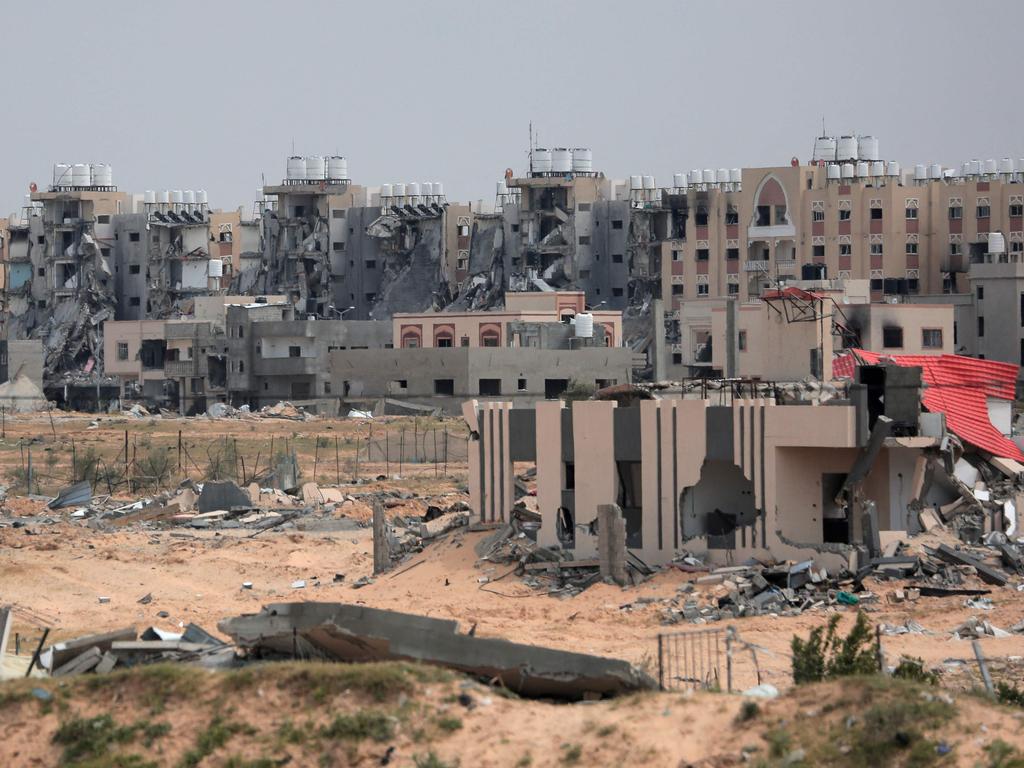
The Israeli army did not immediately respond to an AFP request for comment.
For the past nine days, Israeli troops have been involved in heavy fighting in and around Gaza City’s Al-Shifa Hospital, the territory’s biggest. They claim to have killed 170 Palestinian militants there and arrested hundreds of others.
The Palestinian Red Crescent on Tuesday said that Al-Amal Hospital, near Nasser in Khan Yunis, was “out of service” after Israeli forces evacuated it and blocked the entrance.
The medical organisation said in a statement that “the international community failed to provide the necessary protection” for staff, patients and displaced Gazans sheltering at Al-Amal.
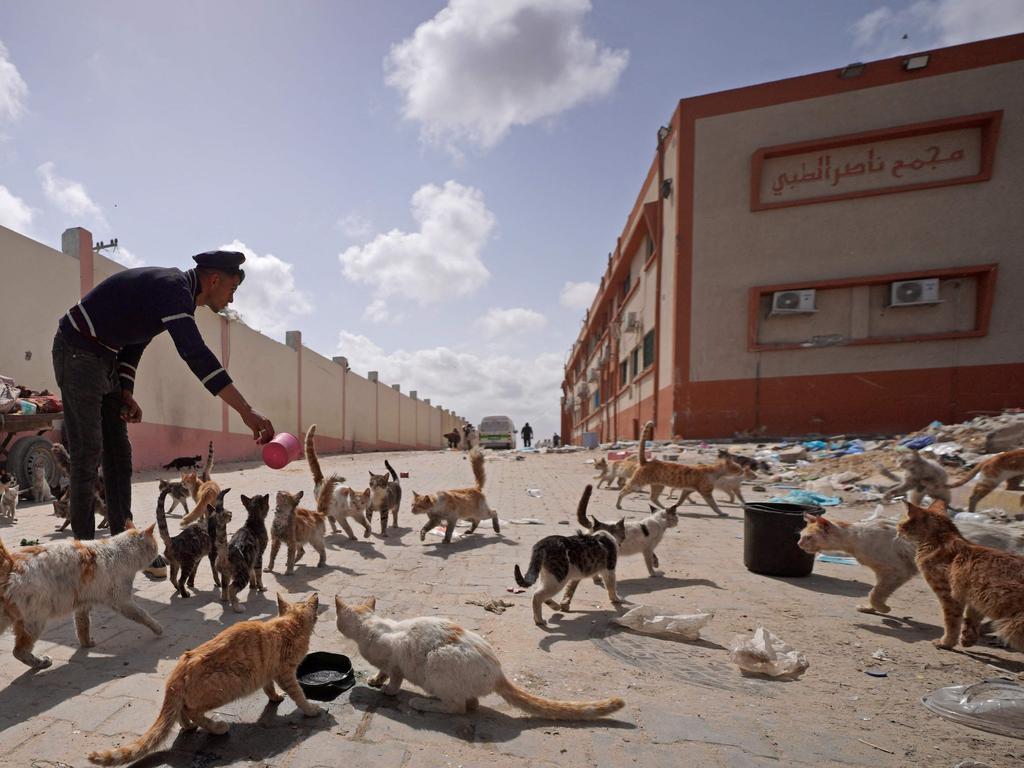
The Red Crescent said one patient and one of its volunteers were killed on Sunday by Israeli fire.
The International Federation of Red Cross and Red Crescent Societies (IFRC) said the hospital has been turned into “a battleground when it should be a sanctuary”.
“The forced closure of Al-Amal Hospital, one of the few remaining medical facilities in the south, has profound implications, leaving countless lives at risk,” the IFRC said in a statement.
“Marked clearly with the red crescent emblem, Al-Amal Hospital is protected under International Humanitarian Law.”
The Israeli military, which on Monday reported killing about 20 fighters around Al-Amal Hospital, did not comment on the statements.
TWO DEAD IN LEBANON STRIKE
Fresh Israeli strikes on eastern Lebanon killed two people, Lebanese official media said, after the deepest raid since cross-border hostilities erupted between Israel and Hezbollah last October.
The Israeli army said it had struck Hezbollah targets “deep inside Lebanese territory” near Zboud on Tuesday local time, some 130km from the Israeli frontier.
Lebanon’s state-run National News Agency (NNA) said “an Israeli strike targeted the Wadi Faara region” near the northeastern city of Hermel, a similar location to the one reported by Israel.
A Lebanese security source, requesting anonymity as they were not authorised to speak to the media, said the strikes targeted an uninhabited area where Hezbollah has positions.
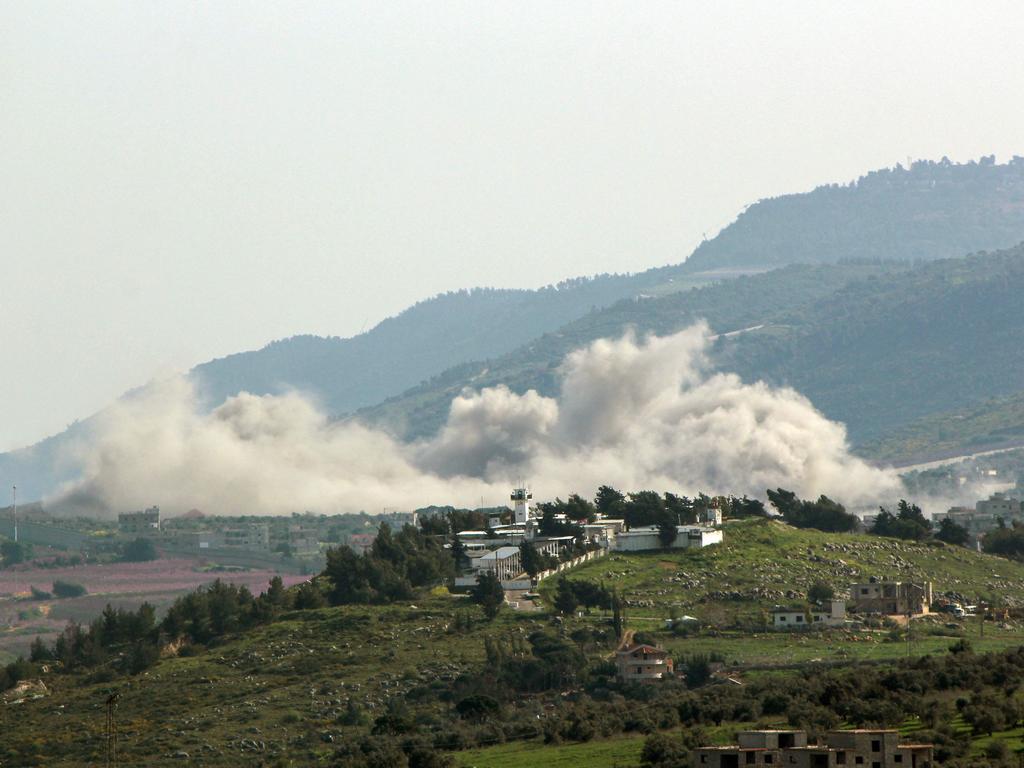
The NNA later reported that a separate “Israeli strike” near Iaat, close to the eastern city of Baalbek, killed two people and wounded another.
An AFP correspondent saw a building belonging to Hezbollah in flames and two people being taken away on stretchers, with a number of ambulances rushing to the scene.
The Israeli military said its “fighter jets struck a landing area and several military structures inside a military compound used by Hezbollah’s aerial unit” at two separate sites “deep inside Lebanese territory”.
‘STOP THE AIR DROPS’
Hamas has urged foreign nations to stop parachuting aid into Gaza after officials and humanitarians said 18 people died trying to reach food packages in the starving north of the Gaza Strip.
Instead, the Palestinian militant group that rules the Gaza Strip demanded that its enemy Israel allow more aid trucks to enter the besieged territory, which the United Nations has warned is on the brink of a “man-made famine”.
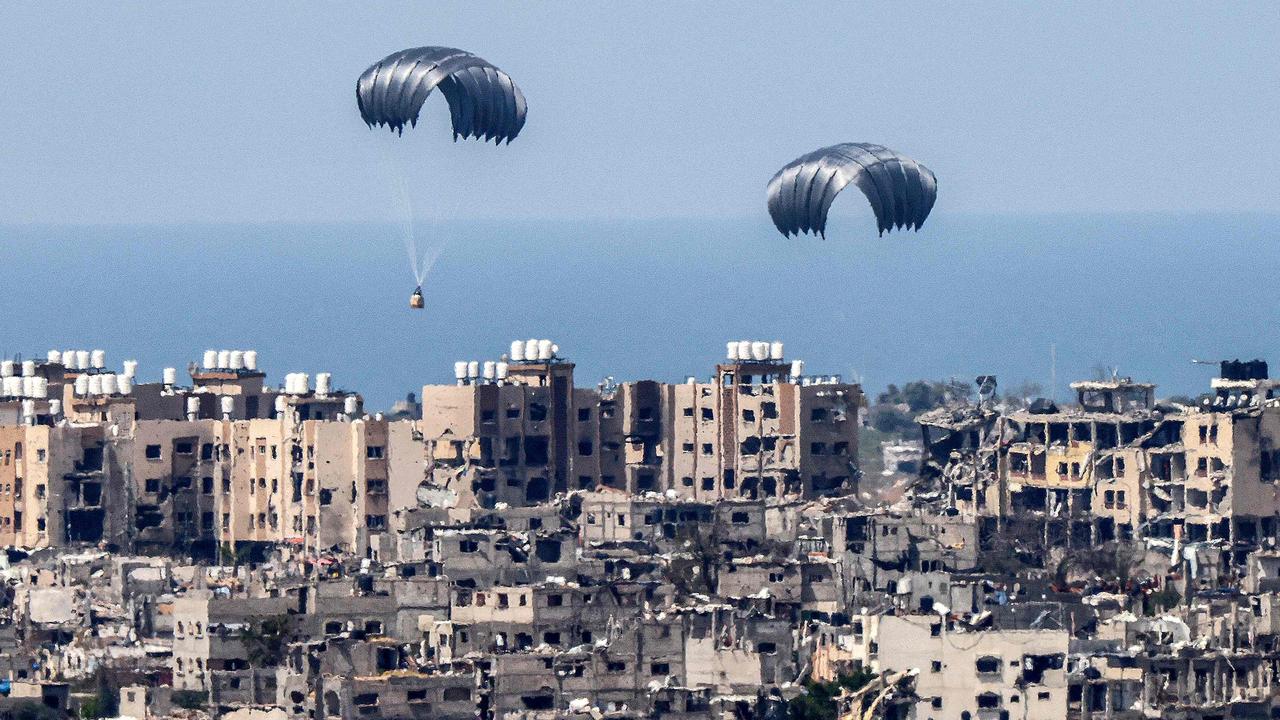
Jordanian, US and other planes have air-dropped food into Gaza, even as UN officials and aid agencies have warned this falls far short of the dire needs of its 2.4 million people and is far less effective than ensuring overland access.
Jordanian, Egyptian, Emirati and German planes again air-dropped relief goods on Tuesday local time, with the sight of food packages floating down on parachutes sending Palestinian crowds rushing toward them.
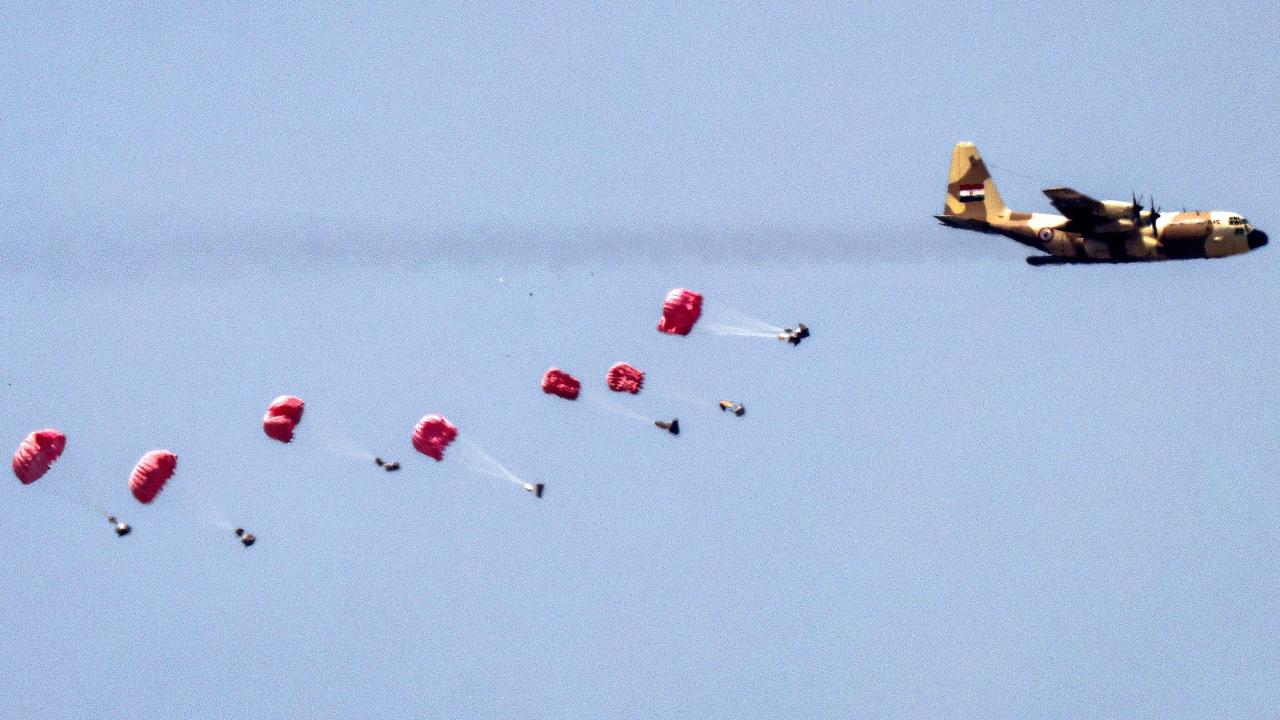
Six people were killed in stampedes and 12 others drowned off the territory’s Mediterranean coast, the Hamas government and the Swiss-based Euro-Med Human Rights Monitor said.
Hamas in a statement called for “an immediate end to air drop operations” and “the immediate and rapid opening of land crossings to allow humanitarian aid to reach our Palestinian people”.
The UN children’s fund, UNICEF, said vastly more aid must be rushed into Gaza by road, rather than air or sea, to avert “this imminent famine”.
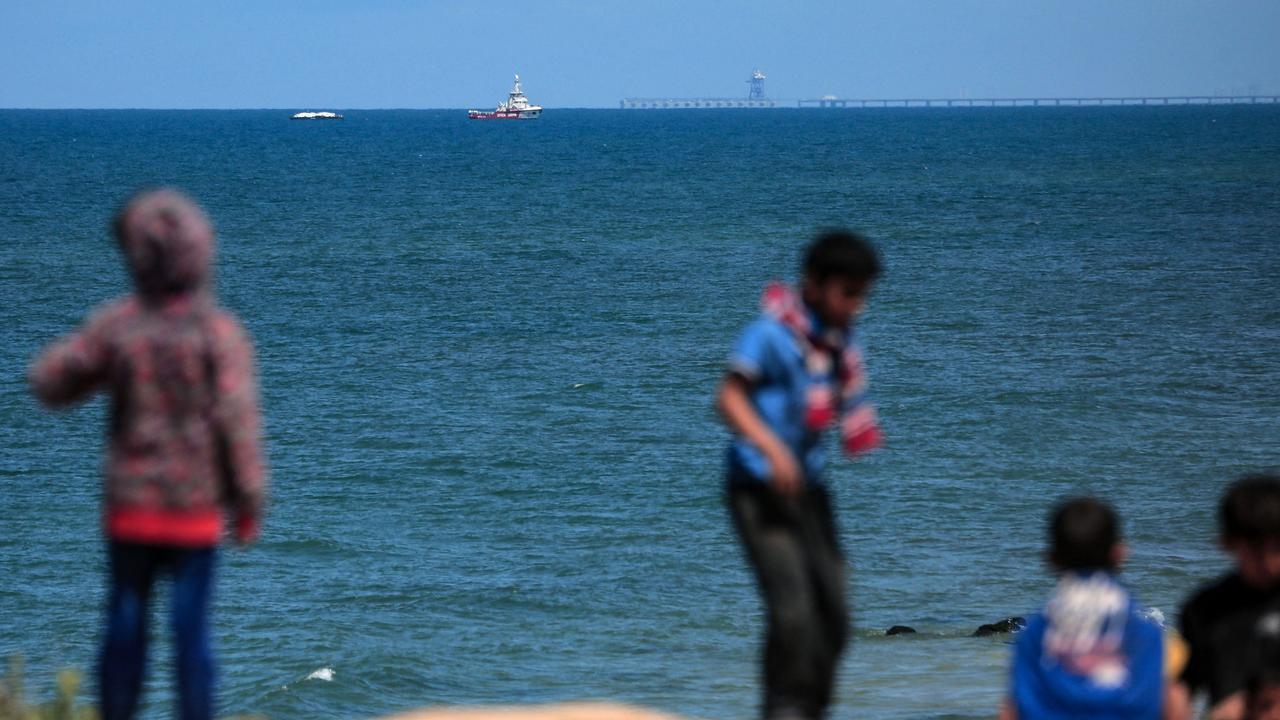
Food aid is usually only air-dropped in crises where “people are cut off for hundreds of kilometres”, said UNICEF spokesman James Elder, speaking via video link from Gaza.
But “the lifesaving aid they need is a matter of kilometres away”, he said, as trucks loaded with aid have been waiting across Gaza’s southern border with Egypt.
“We need to use the road networks.”
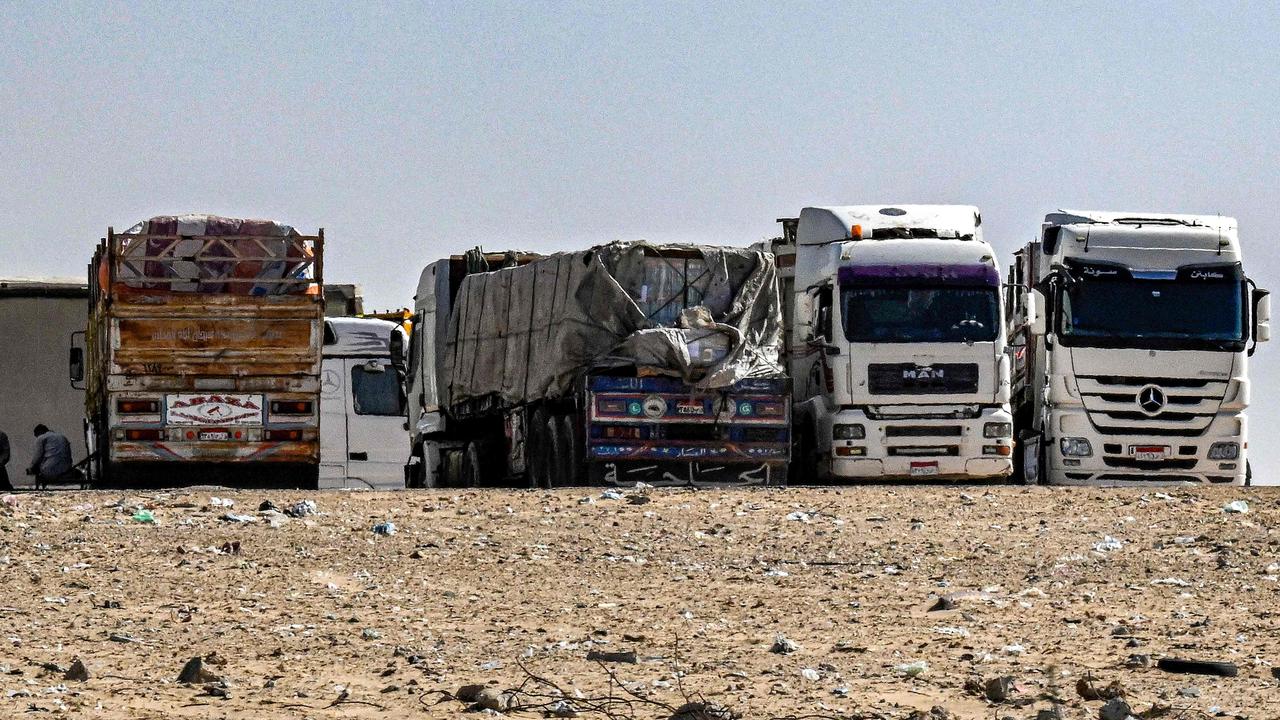
WAR RAGES DESPITE UN CEASEFIRE VOTE
Despite a UN Security Council resolution calling for an immediate ceasefire in Gaza, the Israeli military have continued to wage war on Hamas targets in the Gaza Strip.
For the first time, the resolution was passed by the Council on Monday, after Israel’s closest ally the United States abstained. In previous resolutions, the US had always vetoed the ceasefire.
The resolution from Monday demanded an “immediate ceasefire” for the ongoing Muslim holy month of Ramadan, leading to a “lasting” truce.
It also demands that Hamas and other militants free hostages they took during the October 7 attacks on Israel.
UN Secretary-General Antonio Guterres has called for the resolution to be implemented, saying “failure would be unforgivable”.
The US has stressed that their abstaining to vote did not mark a shift in policy, although it has taken an increasingly tougher line with Israel in recent weeks.
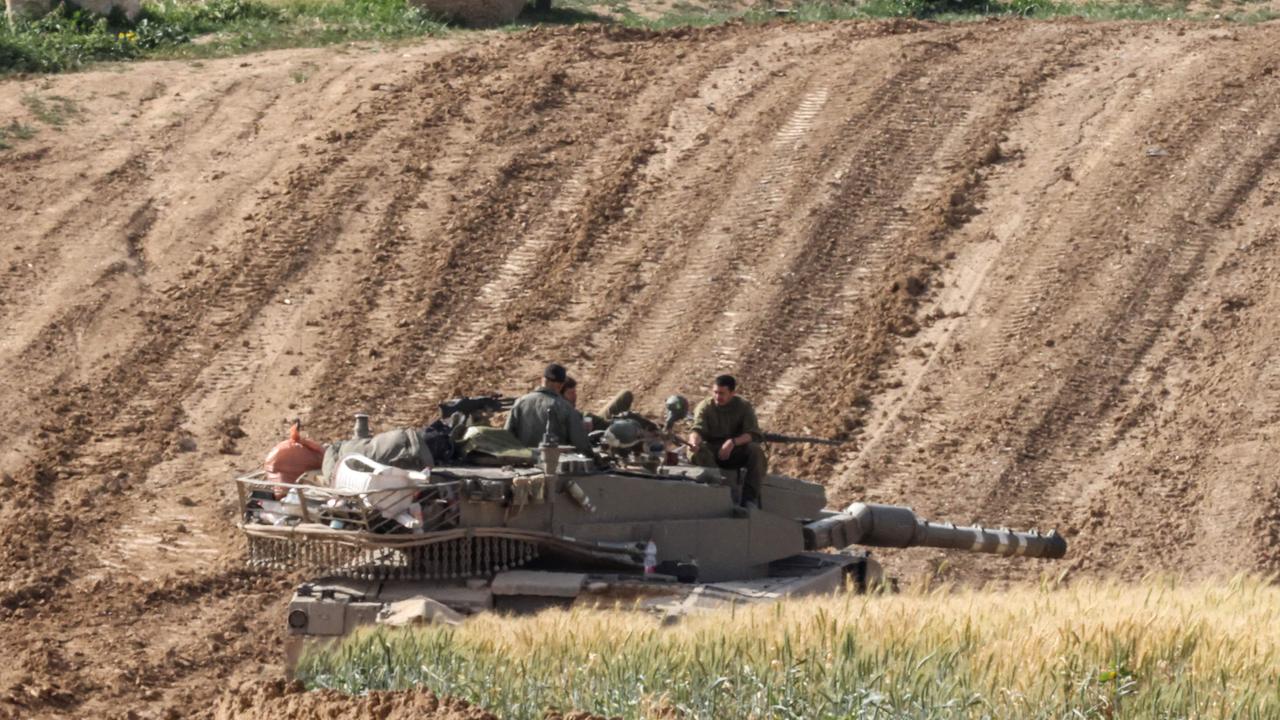
US Defence Secretary Lloyd Austin told his Israeli counterpart Yoav Gallant that civilian casualties in Gaza are “too high,” and said the two would talk about alternatives to a major Israeli operation in the territory’s south.
“In Gaza today, the number of civilian casualties is far too high, and the amount of humanitarian aid is far too low,” Mr Austin said at the beginning of the meeting, adding that it would include discussion of alternatives for targeting Hamas in Rafah.
Mr Gallant meanwhile said they would talk about “developments in Gaza and the means to achieve our goals: the destruction of Hamas organisation and bringing back the Israeli hostages.”
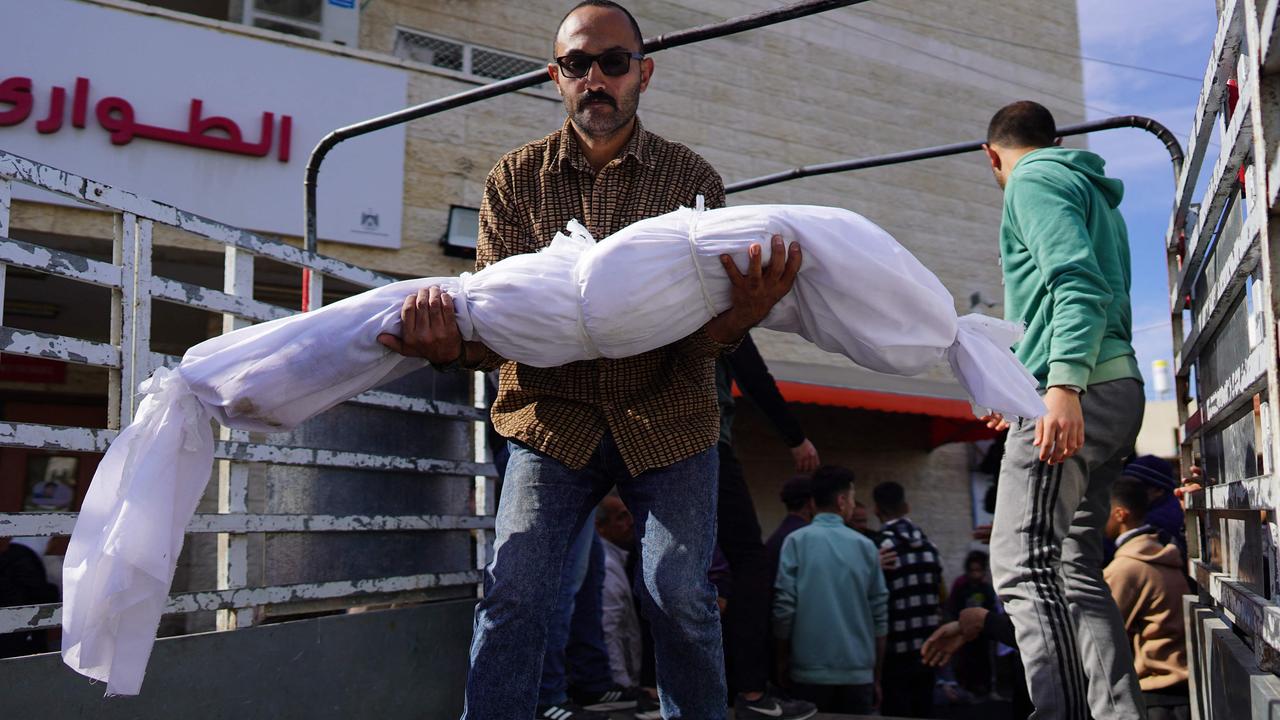
Hamas welcomed the Security Council resolution and reaffirmed its readiness to negotiate the release of hostages in exchange for Palestinian prisoners held by Israel.
Despite mounting international criticism, Israel has continued to defend its stance on the war in Gaza.
On the ground, the fighting rages on unabated.
In southern Gaza’s Rafah, a key flashpoint in the war, witnesses said Israeli jets pummelled the city on Tuesday local time.
According to the Israeli army, anti-rocket sirens sounded in Israeli areas around the Gaza Strip.
While Rafah, like other areas around the Gaza Strip, has come under frequent Israeli strikes, it is the only part of the territory where Israel has not yet sent in ground troops.
Israel’s PM Benjamin Netanyahu’s determination to launch a ground operation in Rafah, the city on Gaza’s southern border where most of the territory’s population is sheltering, has become a key point of contention between Israel and the United States.
UN CEASEFIRE RESOLUTION PASSED
The UN Security Council passed a resolution demanding an immediate ceasefire in Gaza during the month of Ramadan on Tuesday and called for the immediate and unconditional release of all hostages.
This is the first resolution demanding a ceasefire to pass at the council after four previous failed attempts.
The US abstained rather than using its veto while all other members voted in favour.
It comes after Russia and China vetoed an earlier text proposed by the United States.
In a statement, the Israeli PM’s office called the US abstention “a clear retreat from the consistent position of the US in the Security Council since the beginning of the war.”
“This withdrawal hurts both the war effort and the effort to release the hostages, because it gives Hamas hope that international pressure will allow them to accept a ceasefire without the release of our hostages,” Mr Netanyahu’s office added.
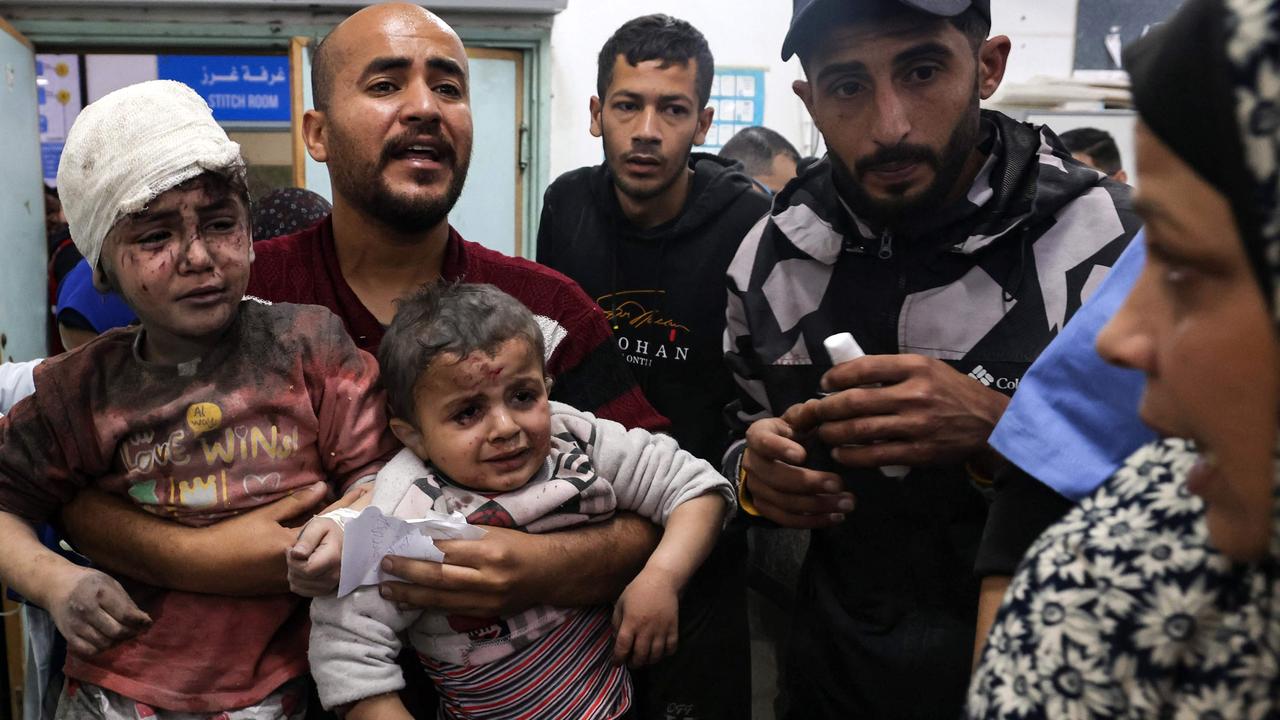
Drawing unusual applause in the often staid Security Council, all 14 other members voted in favour of the resolution which “demands an immediate ceasefire” for the ongoing Islamic holy month of Ramadan.
The resolution calls for the truce to lead to a “lasting, sustainable ceasefire” and demands that Hamas and other militants free hostages seized on October 7.
Russia at the last minute objected to the removal of the word “permanent” ceasefire and called a vote, which failed to gain passage.
The successful resolution was drafted in part by Algeria, the Arab bloc’s current member on the Security Council, with a diverse array of countries including Slovenia and Switzerland.
The United States has vetoed previous bids for a ceasefire but has shown growing frustration with Israel, including its stated plans to expand its military operation to the packed southern city of Rafah.
– with AFP
More Coverage
Originally published as Israel-Hamas war: ‘Intense bombardment’ overnight as fireball lights up Gaza city








